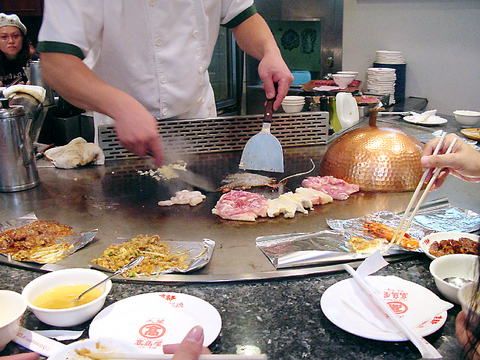Christmas shoppers are now hitting Taipei's many department stores and their food courts.
An indication of the quality of food on offer at Kyoto Teppanyaki Shop, located on the basement floor of the Dayeh Takashimaya Department Store, is the throng of patient shoppers waiting to have their fill. During the weekend, patrons often queue up to one hour to get a seat.
The restaurant's boss, Luo Zhong-liang (

PHOTO, DEREK LEE, TAIPEI TIMES
The restaurant's homemade black pepper sauce which takes four days to prepare is a winning recipe. For the sauce, Luo rejects the use of monosodium glutamate and salt. Rather, he uses ingredients such as chicken bones, onions and beef to produce the sauce's rich flavor. Luo boasted that the proprietors of many first-class teppanyaki restaurants in Taiwan do not expend the same amount of effort as he does to produce the sauce. The restaurant also uses homemade soy sauce which takes up to six days to prepare. Luo refused to reveal the soy sauce's secret ingredients, but would did say that more than 10 Chinese herbs are added to produce a distinctive taste.
Seven chefs man the hot plates cooking the 27 dishes offered on the menu. Each of the chefs has at least 14 years of experience in cooking teppanyaki and being able to talk to your chef from a close distance is one of the unique pleasures of eating a teppanyaki meal.
The chef will usually serve sauteed bean sprouts with soy sauce as the first course. A bowl of white rice and a small serving of fish soup with seaweed follow, just in time to accompany the main dish, be it sirloin or tenderloin steak, mutton, chicken or cod.
A tip to teppanyaki lovers is that the steak can be served in thin slices. The dish is served with shreds of onion dipped in a slightly sweet Japanese sauce. The sliced steak and onion is a delicious combination.

In the March 9 edition of the Taipei Times a piece by Ninon Godefroy ran with the headine “The quiet, gentle rhythm of Taiwan.” It started with the line “Taiwan is a small, humble place. There is no Eiffel Tower, no pyramids — no singular attraction that draws the world’s attention.” I laughed out loud at that. This was out of no disrespect for the author or the piece, which made some interesting analogies and good points about how both Din Tai Fung’s and Taiwan Semiconductor Manufacturing Co’s (TSMC, 台積電) meticulous attention to detail and quality are not quite up to

April 21 to April 27 Hsieh Er’s (謝娥) political fortunes were rising fast after she got out of jail and joined the Chinese Nationalist Party (KMT) in December 1945. Not only did she hold key positions in various committees, she was elected the only woman on the Taipei City Council and headed to Nanjing in 1946 as the sole Taiwanese female representative to the National Constituent Assembly. With the support of first lady Soong May-ling (宋美齡), she started the Taipei Women’s Association and Taiwan Provincial Women’s Association, where she

It is one of the more remarkable facts of Taiwan history that it was never occupied or claimed by any of the numerous kingdoms of southern China — Han or otherwise — that lay just across the water from it. None of their brilliant ministers ever discovered that Taiwan was a “core interest” of the state whose annexation was “inevitable.” As Paul Kua notes in an excellent monograph laying out how the Portuguese gave Taiwan the name “Formosa,” the first Europeans to express an interest in occupying Taiwan were the Spanish. Tonio Andrade in his seminal work, How Taiwan Became Chinese,

Mongolian influencer Anudari Daarya looks effortlessly glamorous and carefree in her social media posts — but the classically trained pianist’s road to acceptance as a transgender artist has been anything but easy. She is one of a growing number of Mongolian LGBTQ youth challenging stereotypes and fighting for acceptance through media representation in the socially conservative country. LGBTQ Mongolians often hide their identities from their employers and colleagues for fear of discrimination, with a survey by the non-profit LGBT Centre Mongolia showing that only 20 percent of people felt comfortable coming out at work. Daarya, 25, said she has faced discrimination since she